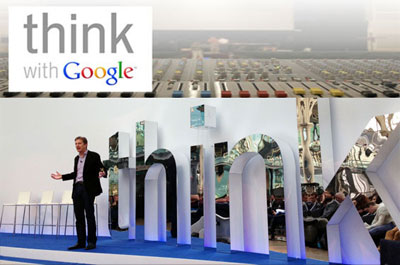Last week was a buzz of activity at Brand Learning as we partnered with Google to share the latest thinking on Re-Mastering Marketing at their 12th March 'Think Branding' conference. Our own Andy Bird took the stage in front of around 350 Marketing leaders from such companies as PepsiCo, GSK, Motorola, Ford and Axa Wealth.
I was fortunate to be able to attend the conference and loved that the content focused not just on 'what' excellence in marketing now looks like, but also on 'how' to actually make it to happen. Recent and relevant case studies and examples were drawn from organisations such as Lego, J&J, Nike, and Disney.

A range of hot topics were covered, but for me the themes that jumped out across all the sessions included:
1. True Consumer-Centricity. Ok, so this may sound like old hat. But really? Are we REALLY being true to this? Or in truth are we being brand or even product centric? Do we genuinely understand consumers' fundamental desires, their core needs and do we envision how we might be able to meet those needs? The needs are simple, profound, elemental – the need to be engaged with other humans, connected with them; the need to be entertained and cheered up, the need to be better at 'stuff' – whether that's as simple as putting on make-up or as complex as getting fit. The opportunity here for brands is genuinely enormous. How do we create a space, a context, a system that meets base needs such as these, and how do we do so in a way that is so consumer-centred - so people centred - that our brand is naturally seen to be there. Lego has answered many of these needs by creating environments for AFOLs (Adult Fans of Lego) that are owned, shaped, and driven by them.
2. It's the 'Why' - not 'What'. In order to fulfil this consumer-centricity, we as brand owners have to do some hard and big thinking. It's easy now to look at Red Bull and admire what they have achieved but also slightly dismiss it as being 'obvious'. But back in the annals of time, it was not remotely obvious that an energy drink should transform itself into an entertainment company. It required experimentation and risk, but also a sense of purpose, a sense of vision – a belief that the brand could go way further. Red Bull may have wings, but what does your brand have that can give it a sense of purpose, a sense of the 'why' it exists, not just 'what' it does?
3. Agility. This is far more than being innovative. Fundamentally, as an organisation, are you organised to take careful, slow decisions with plans set down a year in advance? Or, are you organised to test, learn, respond, move fast, try new things, not worry if they don't work, learn and move on? Could you have got that Oreo tweet out that fast? Working in a networked, digital world means that every department, way beyond marketing, needs to think and behave fluidly, differently – more entrepreneurially. Easy as a start-up – very hard if you are J&J. But they took a resolute, top down decision to win on digital and re-designed and re-engineered all of their working practices through swathes of the organisation to be able to do so. With an increased digital spend from 4% to 22%, their successful online campaigns, including when they asked moms to share videos for Calpol (100k 'Likes' and 24k submissions) and their 'Mouth vs. Life' campaign for Listerine (2.5M channel views), have delivered fantastic results.
4. Mind-set. You can either be a Disruptor or be Disrupted. And the best way to do this is see the inevitability of consumer behaviour, and ride with it rather than try and resist it. Barclaycard are doing just this in their investment in contactless paying – coupled with innovations like SQUARE, wallets will soon be a thing of the past. So if you are a wallet manufacturer, where will your business go? How do you reinvent yourselves to still be in the business of prestige as well as utility? Airbnb fills more rooms across the world every night than Hilton. Shopping malls are becoming empty across the US. What will disrupt your business, your industry? It is inevitable – so how do you exploit it, have fun with it, make money from it rather than resist it?
It was an exciting and provocative day. After all the presentations it became clear to me that ultimately the real enabler of these themes I've just outlined is people. And at the heart of what we at Brand Learning do is help people – individuals, teams and organisations – to transform their performance in a changing world. It's this that gives me the 'why' and engages me way beyond the 'what'.
This post is by Harriet de Swiet, Partner at Brand Learning.

